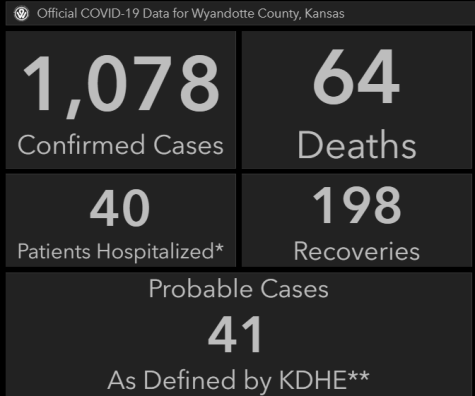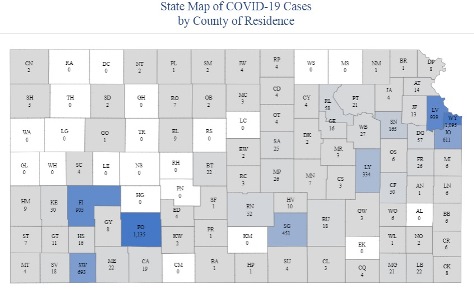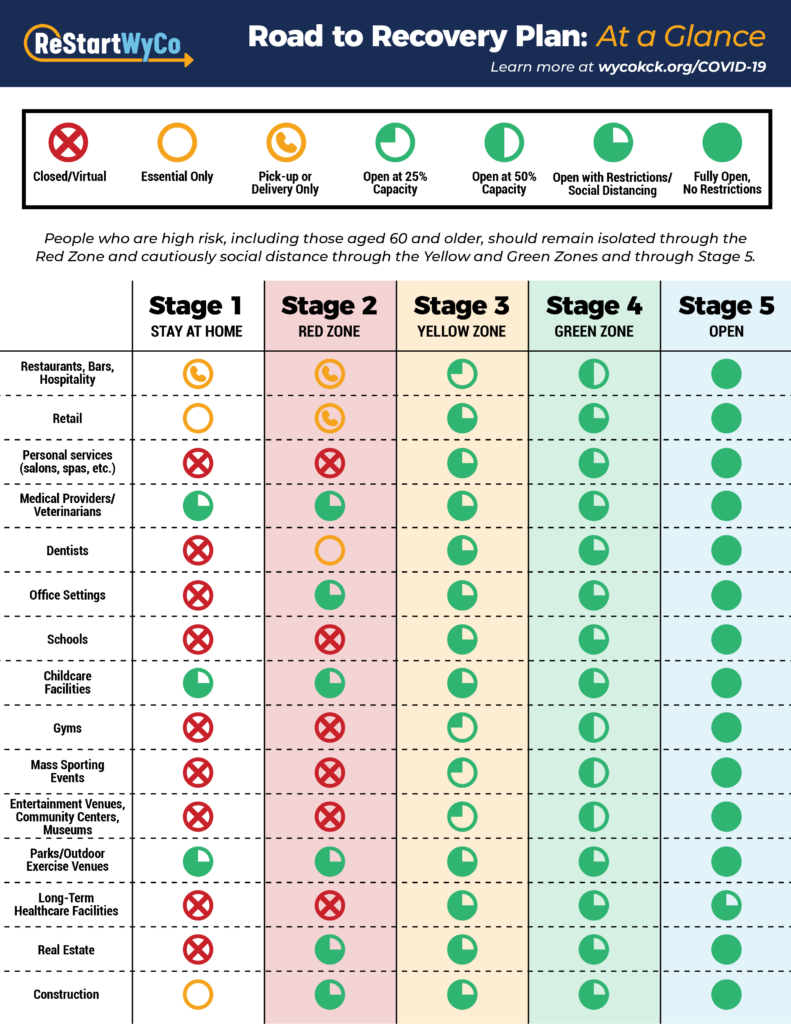

As Wyandotte County reopened Monday under the “red zone,” doctors at the University of Kansas Health System offered some tips to residents to remain safe.
For Wyandotte County, one of the main changes under the “red zone” is that some offices, manufacturing plants and workplaces can reopen. They should maintain 6 feet of space between persons, and everyone must wear masks.
Restaurants in Wyandotte County still will be carryout only, and hair salons are still closed under Wyandotte County’s “red zone.” The restaurants will not reopen until the “yellow zone,” two weeks or more away, at 25 percent capacity.
Retail stores will be accepting phone and online orders, with pickup of ordered items allowed outside or inside.
Churches in Wyandotte County may reopen with 10 percent of the building’s capacity in the “red zone,” maintaining social distancing, avoiding close contact, wearing masks and other rules. Drive-in services still are allowed.
Residents should still stay at home as much as possible in the “red zone,” and should not congregate with others who are not members of their immediate household, according to the Wyandotte County plan. Outdoor activities with other people may involve up to 10 persons, maintaining social distancing.
Those businesses that were open under the “stay-at-home” orders will be able to remain open. Those persons who are older than 60, have underlying medical conditions or who are sick are still asked to stay home.
Wearing a mask is important when people are out in public and in the workplace, especially in areas where they cannot maintain a 6-foot distance, said Dr. Dana Hawkinson, medical director of infection prevention and control at the University of Kansas Health Services.
Amanda Gartner, RN, director of quality and safety at KU Health Services, said the masks provide source control, keeping the wearer’s droplets closer, so they don’t spread out and infect other people.
One office worker didn’t believe she needed to wear a mask, because she was just sitting at her desk, but Gartner advised her to wear a mask because people came over to her desk often and she couldn’t always maintain a 6-foot distance, Gartner said.
Dr. Hawkinson said it was also important to have hand sanitizer at work, avoid touching one’s face and wipe down surfaces.
Gartner said she carries hand sanitizer in her car at all times, and she wears a mask when going to the grocery store. Not everyone is currently wearing a mask at the grocery store, the doctors remarked, from their own personal experience.
The Wyandotte County “red zone” plan states that people should wear masks when they are at stores and in public.
The doctors stated they often wipe down cans, bottles and chip bags when they return home from the grocery store. Washing off vegetables and fruits as they normally do is probably OK, Dr. Hawkinson said.
Dr. Hawkinson said he is not aware of any cases of COVID-19 from bringing items home from a grocery store, while it is more likely to contract the virus while someone is at the store.
Dr. Hawkinson said fingertips and palms need to be washed frequently with soap and water, especially if people have itchy, dry eyes and tend to touch their faces. If possible, use sanitizer, he said.
“This is all about relative risk and not absolute safety,” Dr. Steve Stites, chief medical officer at the University of Kansas Health System, said. People, in general, can’t live in a bubble and will have to re-enter society at some time.
Each person has to determine his own level of risk and decide who’s in their bubble, he said.
According to Gartner, a group of eight friends sitting at the same table at a restaurant may be more likely to transmit the disease if not socially distancing, and that is fairly risky.
Dr. Hawkinson said it is possible to come into contact with droplets on inanimate objects such as a coffee creamer container or syrup container at restaurants.
As youth sports start to open up in some places, the doctors doubted whether it was good idea to start the youth leagues up yet. It’s hard to tell, but there is often some risk in the close contact of youth while playing sports, and also in carpooling back and forth to practices, according to the doctors.
The Wyandotte County plan’s outdoor activities section advises residents never to congregate with others who are not members of their own immediate household. For children, use of commonly touched items such as balls, sports equipment and toys is discouraged if the children are not in the same household.
The doctors do not believe there is any risk for “over-sanitizing.”
According to Dr. Hawkinson, people will still come into contact with antigens and pathogens every day in the air, and frequent hand-washing and sanitizing will not decrease that. Sanitizing will not hurt the immune system, he said.
Dr. Hawkinson said as other places around the world have started to open up, they have started to see more COVID-19 cases.
Dr. Stites said where people are congregating, the risk is still there and will still be around June 15, even if all the restrictions come off.
“The rules haven’t changed just because the calendar did,” he said. “What you still have to do is think about what is the personally responsible thing to do. It’s not up to the politicians to tell you what to do.”
“Even as life opens up, you still have to go about your life in a way that is personally responsible,” Dr. Stites said.
He said people who are wondering if it is safe to go to work have to evaluate their circumstances and personal risk and determine what they can do to make their environment safer. They should wear a mask, and if possible, a shield. They should continue washing their hands.
Dr. Hawkinson reported the number of positive COVID-19 inpatients increased a little over the weekend at KU Health System, and is at 28 today, with 11 patients in the intensive care unit. The number was 24 patients on Friday, when nine patients were in the ICU unit.
Wyandotte County reported 1,078 positive COVID-19 cases at 11:55 a.m. Monday, an increase of nine since Sunday afternoon. There were 40 patients hospitalized, and 64 deaths, the same number as Sunday.
Kansas reported 7,116 cases in 83 counties on Monday, an increase of 132 cases since Sunday, according to the Kansas Department of Health and Environment. There were 158 deaths, an increase of one since Sunday.
To see more of the doctors’ responses at the KU Health System news conference, visit https://www.facebook.com/kuhospital/videos/239218183956749/.
More information about the “red zone” rules is online at the ReStart WyCo hub at https://wyandotte-county-covid-19-hub-unifiedgov.hub.arcgis.com/pages/restartwyco.
The ReStart WyCo plan is at https://www.wycokck.org/WycoKCK/media/Health-Department/Documents/Communicable%20Disease/COVID19/RestartWYCOGuidanceDocument043020.pdf.
Several Wyandotte County pop-up testing sites are listed at https://wyandotte-county-covid-19-hub-unifiedgov.hub.arcgis.com/pages/what-to-do-if-you-think-you-have-covid-19.
The UG’s COVID-19 webpage is at https://alpha.wycokck.org/Coronavirus-COVID-19-Information.
The Kansas COVID-19 website is at https://covid.ks.gov/.
The Kansas COVID-19 resource page is at https://govstatus.egov.com/coronavirus
Information from the CDC is at https://www.cdc.gov/coronavirus/2019-nCoV/.

